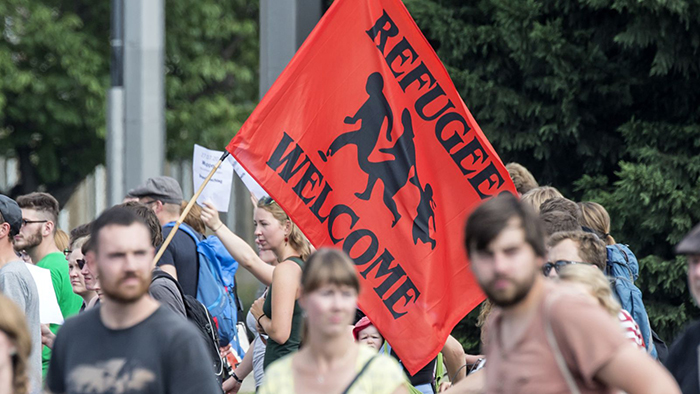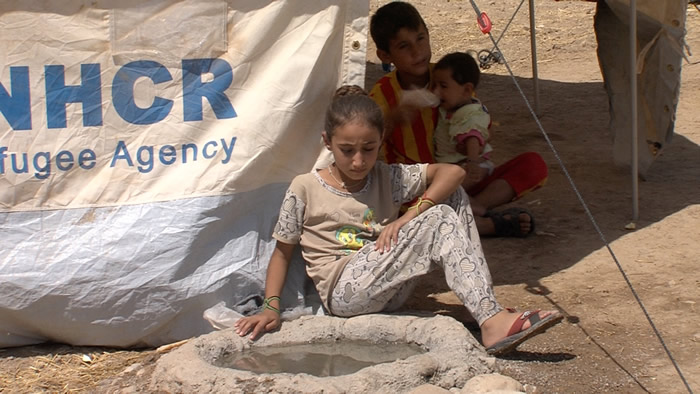Forced Migration – Finding New Perspectives

These days it seems Europe lost its basic resource – its unity. Not because of environmental discrepancy, not because of economical clashes, not even because of the Greek crisis. To establish a broader feeling of disagreement within the European members it needed ten thousands and more refugees to cross the European border. That’s an awkward and doubtful point to confess for the European Union – but it’s an even more dreadful and disastrous point for all those people who are fleeing from terror, war and horrifying life conditions, searching for a place to stay to find just one thing: personal freedom and self-determination of the location.
Last couple of weeks, months and years many people died on the run within a global migration. Men, women as well as children: people in every age and from different countries loose their lives and in recent times; it becomes more and more obvious that a huge number of them die on the way to or through Europe. No day passes by without news covering that again hundreds and thousands of people died while crossing the Aegean Sea to reach the Greek Islands. The weird thing is, following the top-news of the last months within Europe it seems these problems came into being from one moment to another. But of course, the largest migration since World War II didn’t just started yesterday. Escape movements are an ever-present state; it just took a while until the huge number of refugees arrived at the European border.
[widgetkit id=19753]
In the past, crisis regions’ neighboring countries were the first ones who received a big number of displaced people and it becomes clear by looking at the numbers that they still host the biggest population: in 2015 the number of refugees and asylum-seekers for example in Turkey is expected to rise over 2 million, including 1.7 million Syrian refugees and there is Lebanon, with its own population of around 4.5 million people, hosting more than 1.3 million refugees. Worldwide there are almost 60 million people on the run. In 2014 626.000 refugees applied for asylum in Europe and even there is an enormous increase noticeable within this year; Europe is still far away from the whole digit.
The Middle East is not meant to be fragmented. This was the doing of the colonial powers at the Berlin Conference of 1884–85, also known as Congo Conference organized by Germany. The conference eliminated or overrode most existing forms of autonomy and self-governance in the Middle East and Africa and was the beginning of the state as nation with its artificial territory. The conference and the doing of the colonial powers after World War I draw ‘lines in the sand’ to mark borders and territories called nations. A world order that exists for one century until recent unrests, which leads to the failure of nations globally and the largest migration worldwide since World War II.
[widgetkit id=19746]
Indeed confusing times are at present and trouble is sure to follow. All nations are effected but unfortunately their political direction is not in line which leads to even more red-hot news and partly sends diffuse signals into the world. For instance it was Germany who opened its borders short-term for refugees, especially for Syrians, but nowadays started to have border controls again and reduced foot distribution for refugees. Hungary just shut down its borders completely by building a wall and passing a law to stop border crossing. From one moment to another the old route was blocked and a new route was found: Through Croatia – and the next country starts to struggle. Furthermore even in countries like Turkey, were the refugee situation was developing more or less smooth in the past, things are becoming more and more chaotic – referring to the current protest at the Istanbul main bus station where currently about 2000 refugees protest to enter Europe by land. Beside the current discrepancy regarding refugee politics also the main reasons of the refugee crisis, its main triggers, remain untouched.
[widgetkit id=19749]
Beside all the chaotic and tragic developments of nowadays, let’s not forget about those ones who help, who support, who take action. It starts in everybody’s surrounding: people donate money, food, clothes or sleeping places – and even language lessons are offered by people without any teaching background. Not to forget the roots of all support and activism, there are NGOs, working 24/7 under hard conditions in troubled regions like close to Syrian border or in the Northern Iraq. They started to work in the past, when help was already needed but nobody there to help. Indeed, as told before, it took a long time until those regions of terror got into publics and governments’ focus and still civil societies beyond any borders take a big part because their help is on the spot – as far as it’s possible. In addition to that, there are initiatives that came into being promising projects build on little thoughts. For example there is the Kiron University who’s aim is to give refugees access to free education. There is the German and Austria-based platform Flüchtlinge Willkommen, which aims to bring citizens and migrants into contact to share a flat and there are apps created to give refugees advises how to manage the asylum procedure. Last points discussed make it clear that there is help of all kinds: from social support to artwork. With the Manifesto for an Alternative Cartography Leopold Lambert introduced new ways of envisioning governance. It represents the world, no longer by its national borders but, rather through its regional ones. The Istanbul based Searching Traces project makes it obvious that the diversity of help knows no limits: the project contains workshops and activities with the aim to give migrants and refugees the opportunity to find new perspectives by looking back and reappraise their experiences. All these examples are a start that has to be made to move on. Only a new world order can be the cornerstone to overcome forced migration that is oppressed in the name of nations.

